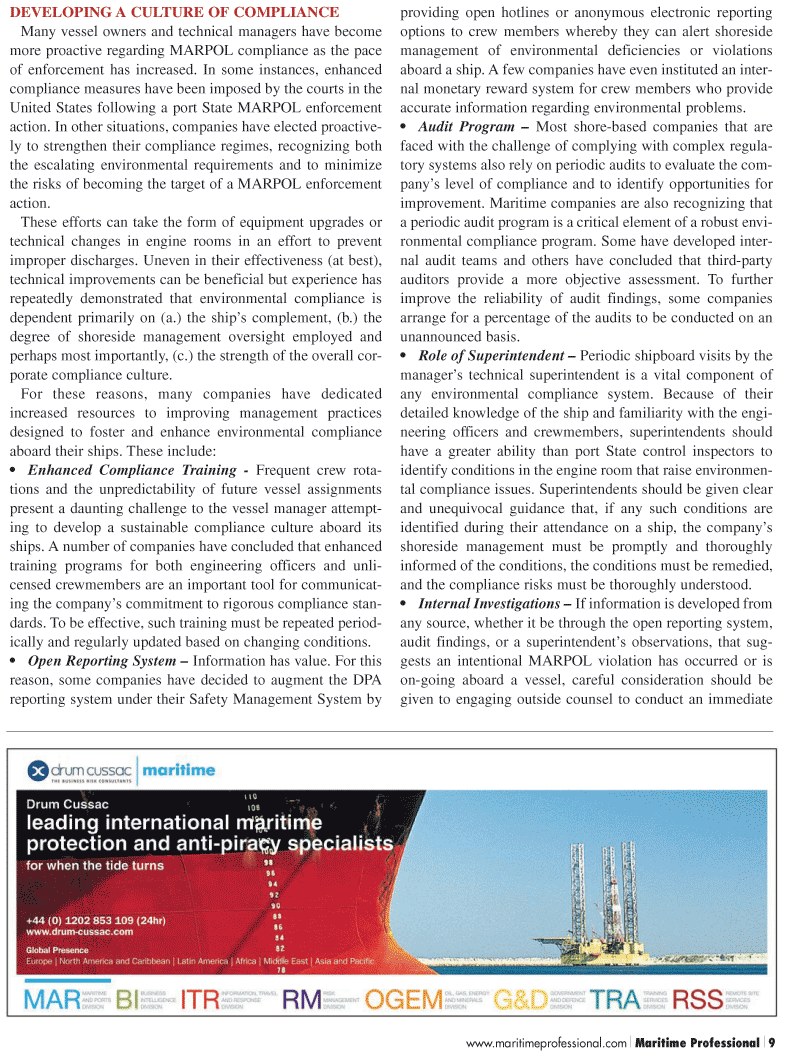
Page 9: of Maritime Logistics Professional Magazine (Q2 2011)
Energy Transportation
Read this page in Pdf, Flash or Html5 edition of Q2 2011 Maritime Logistics Professional Magazine
www.maritimeprofessional.com Maritime Professional 9
DEVELOPING A CULTURE OF COMPLIANCE
Many vessel owners and technical managers have become more proactive regarding MARPOL compliance as the pace of enforcement has increased. In some instances, enhanced compliance measures have been imposed by the courts in the
United States following a port State MARPOL enforcement action. In other situations, companies have elected proactive- ly to strengthen their compliance regimes, recognizing both the escalating environmental requirements and to minimize the risks of becoming the target of a MARPOL enforcement action.
These efforts can take the form of equipment upgrades or technical changes in engine rooms in an effort to prevent improper discharges. Uneven in their effectiveness (at best), technical improvements can be beneficial but experience has repeatedly demonstrated that environmental compliance is dependent primarily on (a.) the ship’s complement, (b.) the degree of shoreside management oversight employed and perhaps most importantly, (c.) the strength of the overall cor- porate compliance culture.
For these reasons, many companies have dedicated increased resources to improving management practices designed to foster and enhance environmental compliance aboard their ships. These include: • Enhanced Compliance Training - Frequent crew rota- tions and the unpredictability of future vessel assignments present a daunting challenge to the vessel manager attempt- ing to develop a sustainable compliance culture aboard its ships. A number of companies have concluded that enhanced training programs for both engineering officers and unli- censed crewmembers are an important tool for communicat- ing the company’s commitment to rigorous compliance stan- dards. To be effective, such training must be repeated period- ically and regularly updated based on changing conditions. • Open Reporting System – Information has value. For this reason, some companies have decided to augment the DPA reporting system under their Safety Management System by providing open hotlines or anonymous electronic reporting options to crew members whereby they can alert shoreside management of environmental deficiencies or violations aboard a ship. A few companies have even instituted an inter- nal monetary reward system for crew members who provide accurate information regarding environmental problems. • Audit Program – Most shore-based companies that are faced with the challenge of complying with complex regula- tory systems also rely on periodic audits to evaluate the com- pany’s level of compliance and to identify opportunities for improvement. Maritime companies are also recognizing that a periodic audit program is a critical element of a robust envi- ronmental compliance program. Some have developed inter- nal audit teams and others have concluded that third-party auditors provide a more objective assessment. To further improve the reliability of audit findings, some companies arrange for a percentage of the audits to be conducted on an unannounced basis. • Role of Superintendent – Periodic shipboard visits by the manager’s technical superintendent is a vital component of any environmental compliance system. Because of their detailed knowledge of the ship and familiarity with the engi- neering officers and crewmembers, superintendents should have a greater ability than port State control inspectors to identify conditions in the engine room that raise environmen- tal compliance issues. Superintendents should be given clear and unequivocal guidance that, if any such conditions are identified during their attendance on a ship, the company’s shoreside management must be promptly and thoroughly informed of the conditions, the conditions must be remedied, and the compliance risks must be thoroughly understood. • Internal Investigations – If information is developed from any source, whether it be through the open reporting system, audit findings, or a superintendent’s observations, that sug- gests an intentional MARPOL violation has occurred or is on-going aboard a vessel, careful consideration should be given to engaging outside counsel to conduct an immediate

 8
8

 10
10
